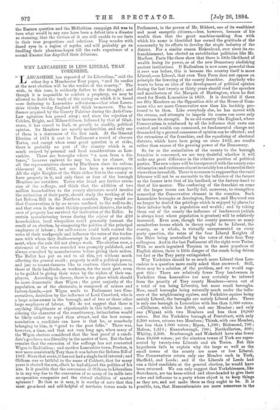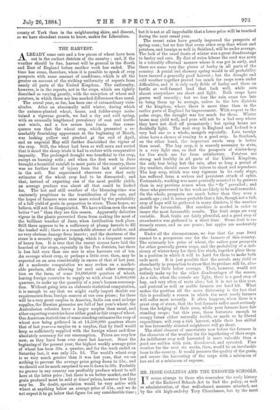WHY LANCASHIRE IS LESS LIBERAL THAN YORKSHIRE.
" LANCASHIRE has repented of its Liberalism," said the other day a Manchester Tory paper, "and its verdict at the next election will be the verdict of the country." The wish, in this case, is evidently father to the thought ; and though it is impossible to confute a prophecy, we may be allowed to doubt the truth of the saying on which it is based —so flattering to Lancashire self-esteem—that what Lanca- shire thinks to-day England will think to-morrow. The in- fluence acquired by the County Palatine during the Anti-Corn- Law agitation has passed away ; and since the rejection of Cobden, Bright, and Milner-Gibson, followed by that of Glad- stone, it has ceased to lead, or greatly to modify, political opinion. Its Members are mostly mediocrities, and only one of them is a statesman of the first rank. At the General Election of 1874 it sent to Parliament a crowd of obscure Tories, and except when some great question is at stake, there is probably no part of the country which is so much swayed by personal and local considerations as Lan- cashire. There are boroughs where "a man from a dis- tance," however eminent he may be, has no chance. Of all the representatives chosen by Blackburn since its enfran- chisement in 1832, not one has been a non-ratepayer. All the eight Knights of the Shire either live in the county or have property in it, and only three or four of the borough Members are outsiders. Tories who dread any further exten- sion of the suffrage, and think that the addition of two million householders to the county electorate would involve the extinction of their party, should study the working of the last Reform Bill in the Northern counties. They would see that Conservatism is by no means confined to the well-to-do ; and that even in the most thickly-populated districts, the influ- ence of property has survived the institution of the Ballot. In certain manufacturing towns during the regime of the X10 householders, local wirepullers could generally forecast the result of an election, by comparing the politics of the principal employers of labour ; for mill-owners could both control the votes of their workpeople and influence the votes of the trades- men with whom they dealt—except in times of great excite- ment, when the rule did not always work. The election over, a statement of the votes recorded was promptly published, and always consulted by manufacturers before giving their orders. The Ballot has put an end to all this, yet without much affecting the general result ; property is still a political power, and just as tenant-farmers like to conform their opinions to those of their landlords, so workmen, for the most part, seem to be guided in giving their votes by the wishes of their em- ployers. According to theory, there is no place which should be more democratic than Wigan ; the great majority of the population, as of the electorate, is composed of miners and factory-hands,—yet Wigan sends to Parliament two Con- servatives, doubtless by the influence of Lord Crawford, who is a large mine-owner in the borough, and of two or three other large employers of labour, We do not suggest that there is anything illegitimate or objectionable in this influence ; con- sidering the character of the constituency, intimidation would be likely rather to repel than attract, and the best recom- mendation a candidate can have is that he, or somebody belonging to him, is "good to the poor folks." There was, however, a time, and that not very long ago, when many of the Wigan electors considered that the best proof of a candi- date's goodness was liberality in the matter of beer, But the fact remains that the extension of the suffrage has not converted Wigan to Radicalism; and another Lancashire town, Preston, is now more consistently Tory than it was before the Reform Bill of 1867. Since that event, it has not had a single lucid interval' and Oldham was so faithful to the name of Cobbett, that for many years it elected the son, albeit he had abjured the politics of his sire. Is it possible that the conversion of Old ham to Liberalism is in any way due to the conversion of so many of its mills into co-operative companies and the virtual abolition of master spinners ? Be that as it may, it is worthy of note that this most go-a-head and self-helpful of northern towns sends to
Parliament, in the person of Mr. Hibbert, one of its wealthiest and most energetic citizens,—less, however, because of his wealth than that the great machine-making firm with which his name is identified has earned the gratitude of the community by its efforts to develop the staple industry of the district. For a similar reason Birkenhead, ever since its en- franchisement, has elected an antediluvian politician like Mr. MacIver. Facts like these show that there is little likelihood of wealth losing its power, or of the new Democracy abolishing ancient institutions. If Radicalism is now more powerful than it ever was before, this is because the country itself is more Liberal,—so Liberal, that even Tory Peers dare not oppose on principle the lowering of the county franchise. Anybody who wants to form an idea of the development of political opinion during the last twenty or thirty years should read the speeches and manifestoes of the Marquis of Hartington, when he first stood for North Lancashire in 1859. It is doubtful if there are fifty Members on the Opposition side of the House of Com- mons who are more Conservative now than his lordship pro- fessed to be then. Like everybody else, he has moved with the stream, and attempts to impede its course can serve only to increase its strength. In an old country like England, where Conservatism is reinforced by all the influence that caste can control and wealth can command, no fundamental change not demanded by a general consensus of opinion can be effected; and the extensions of the franchise, and the equalising of electoral districts, which have been going on since 1832, are results rather than causes of the growing power of the Democracy.
So far as the assimilation of the county to the borough franchise is concerned, we are very doubtful whether it will make any great difference in the relative position of political parties. The new voters will be incorporated with the county con- stituencies; and rustics are almost invariably less advanced in their views than townsfolk. There is no reason to suppose that the rural labourer will not be as amenable to the influence of the farmer as the farmer is- to that of his landlord, or the factory-hand to that of his master. The conferring of the franchise on some of the larger towns can hardly fail, moreover, to strengthen somewhat the Conservative element in the counties. Such Lancashire boroughs as Accrington, Barrow, and Heywood can no longer be denied the privilege which is enjoyed by places far their inferior both in population and wealth ; and by taking them out of the county the influence of landowners (which is always least where population is greatest) will be relatively increased. Even now, though the county possesses so many memberless towns which in theory ought to be Liberal, the county, as a whole, is virtually unrepresented on every party question, the votes of the four Liberal Knights of the Shire being neutralised by the votes of their four Tory colleagues. And in the last Parliament all the eight were Tories. With so much ingrained Toryism in the most populous of English shires, there is little danger of the coach being driven too fast or the Tory party extinguished.
Why Yorkshire should be so much more Liberal than Lan- cashire is a question more easily asked than answered. Still, there may be a solution ,of the problem, and we would sug- gest this : There are relatively fewer Tory landowners in Yorkshire than Lancashire (as may certainly be inferred from the paucity of Tory county Members—seven out of a total of ten being Liberals), but more small boroughs. Now, small boroughs being naturally much under the influ- ence of the neighbouring squires, and Yorkshire squires being mainly Liberal, the boroughs are mainly Liberal also. There is only one borough in Lancashire with less than 3,000 voters, —Clitheroe, which has 2,000, and one Member ; and only one (Wigan) with two Members and less than 10,000 voters. But the Yorkshire borough of Pontefract, with only 2,300 voters, returns two Members ; Thirsk, with one Member, has less than 1,000 voters ; Ripon, 1,100; Richmond, 700; Melton, 1,374; Knaresborough, 700; Northallerton, 800; Whitby, 2,300. Scarborough and Wakefield have also fewer than 10,000 voters ; yet the nineteen towns of York are repre- sented by twenty-two Liberals and six Tories. But this hypothesis fails to explain why the large as well as the small towns of the county are more or less Liberal. The Conservatives return only one Member each in York, Sheffield, and Leeds ; and if the Liberals of Leeds had run a third candidate at the general election, he would have been returned. We can only suggest that Yorkshiremen, like Scotchmen, are too keen-witted and clear-headed to give their votes and influence to a party whose object is to keep things as they are, and not make them as they ought to be. It is possible, too, that Nonconformists are more numerous in the
county of York than in the neighbouring shire, and dissent, as we have abundant reason to know, makes for Liberalism.



































 Previous page
Previous page